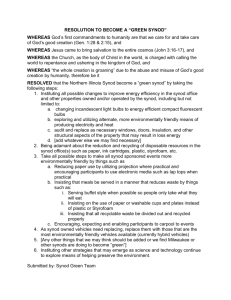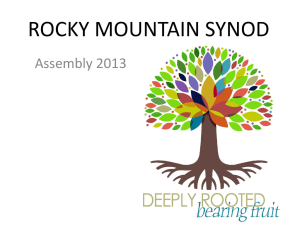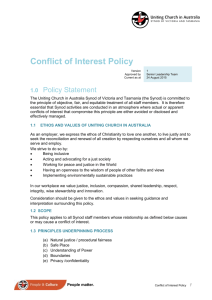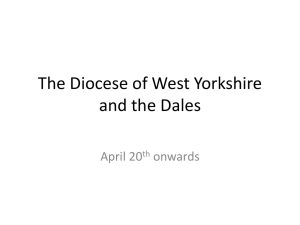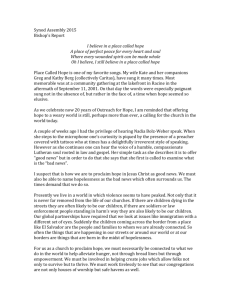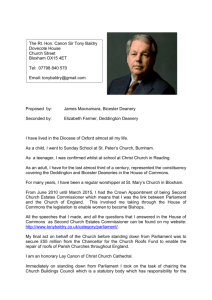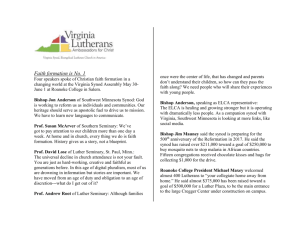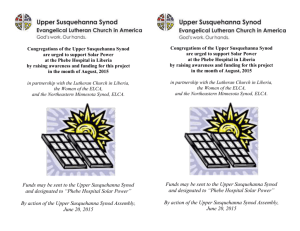Policy 2011-002 Sierra Pacific Synod Gift Acceptance Policy I
advertisement
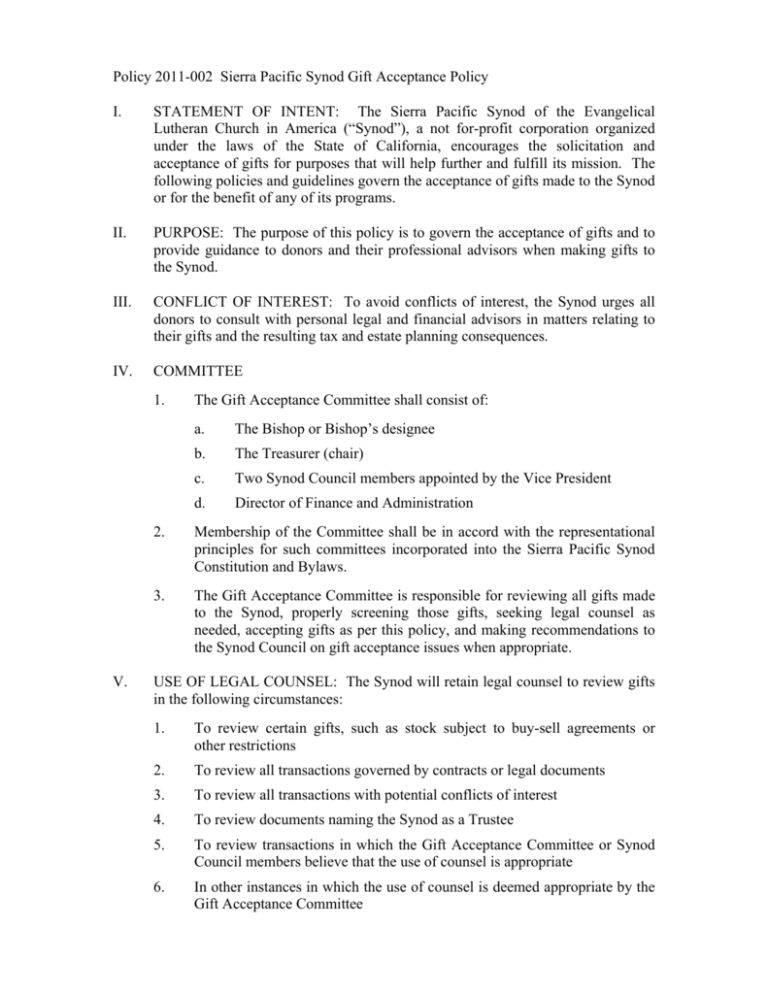
Policy 2011-002 Sierra Pacific Synod Gift Acceptance Policy I. STATEMENT OF INTENT: The Sierra Pacific Synod of the Evangelical Lutheran Church in America (“Synod”), a not for-profit corporation organized under the laws of the State of California, encourages the solicitation and acceptance of gifts for purposes that will help further and fulfill its mission. The following policies and guidelines govern the acceptance of gifts made to the Synod or for the benefit of any of its programs. II. PURPOSE: The purpose of this policy is to govern the acceptance of gifts and to provide guidance to donors and their professional advisors when making gifts to the Synod. III. CONFLICT OF INTEREST: To avoid conflicts of interest, the Synod urges all donors to consult with personal legal and financial advisors in matters relating to their gifts and the resulting tax and estate planning consequences. IV. COMMITTEE 1. V. The Gift Acceptance Committee shall consist of: a. The Bishop or Bishop’s designee b. The Treasurer (chair) c. Two Synod Council members appointed by the Vice President d. Director of Finance and Administration 2. Membership of the Committee shall be in accord with the representational principles for such committees incorporated into the Sierra Pacific Synod Constitution and Bylaws. 3. The Gift Acceptance Committee is responsible for reviewing all gifts made to the Synod, properly screening those gifts, seeking legal counsel as needed, accepting gifts as per this policy, and making recommendations to the Synod Council on gift acceptance issues when appropriate. USE OF LEGAL COUNSEL: The Synod will retain legal counsel to review gifts in the following circumstances: 1. To review certain gifts, such as stock subject to buy-sell agreements or other restrictions 2. To review all transactions governed by contracts or legal documents 3. To review all transactions with potential conflicts of interest 4. To review documents naming the Synod as a Trustee 5. To review transactions in which the Gift Acceptance Committee or Synod Council members believe that the use of counsel is appropriate 6. In other instances in which the use of counsel is deemed appropriate by the Gift Acceptance Committee VI. TEMPORARILY AND PERMANENTLY RESTRICTED GIFTS: The Synod will accept unrestricted gifts, and gifts to specific programs and purposes, provided that such gifts are not inconsistent with the Synod’s stated values, mission, and vision. The Synod will not accept gifts that are too restrictive in purpose. Gifts that are too restrictive are those that violate terms of the Synod’s bylaws, gifts that are too difficult to administer, or gifts that are for purposes outside the mission of the Synod. VII. TYPES AND FORMS OF GIFTS: The Sierra Pacific Synod encourages these types of gifts: 1. Cash 2. Tangible personal property a. The Synod will accept gifts of tangible personal property only when the property can be directly used by the Synod or can be sold and thus quickly converted in cash. The decision of types of property that meet these requirements will be made by the Gift Acceptance Committee. 3. Securities a. It is the Synod’s policy to sell any securities received as gifts. Furthermore, Synod staff will inform donors that it is the Synod’s policy to sell any securities that are gifted. The Synod accepts gifts of publicly traded securities. Gifts of closely held securities will be considered on a case by case basis by the Gift Acceptance Committee. 4. 5. Charitable Bequests a. When arranging to make a bequest, the Synod encourages donors to use broad language in recognition that the Synod’s needs, policies, and circumstances can change over time. Additionally, if in the opinion of the Synod all or part of the funds cannot be applied in strict conformance with the purpose(s) previously stated, the Synod may use these funds for other appropriate purposes as nearly aligned to the original intent of the donor as good conscience and need dictate within the authorized powers of the Synod. b. Suggested language for a bequest: “I give and bequeath $____ from my estate to The Sierra Pacific Synod of the Evangelical Lutheran Church in America, a California non-profit corporation, for its general purposes.” c. Suggested language for a remainder gift: “I give and bequeath all (or ___%) of the rest, residue, and remainder of my estate to The Sierra Pacific Synod of the Evangelical Lutheran Church in America, a California non-profit corporation, for its general purposes.” Real Estate a. 6. Retirement Plan and Life Insurance Designations a. 7. Gifts of real estate will be considered on a case by case basis by the Gift Acceptance Committee. The Synod has no intention of holding or managing real property unless it is deemed significantly appropriate for future mission development. The Synod strongly encourages donors to make designations on the Synod’s behalf. The Synod requests a copy of designation paperwork when it is completed, in order to confirm that it is completed properly and includes all the necessary waivers from the donor’s spouse. Synod staff shall take the lead in promoting and encouraging these gifts to the Synod. VIII. REPORTING REQUIREMENTS: The Synod strives to meet all reporting obligations, both of donors and the Internal Revenue Service (IRS). IX. 1. To Donors: All individual donors who give a gift valued at $250 or greater will receive written acknowledgement of the gift. The acknowledgment will make a good faith estimate of the value of goods or services, if any, provided by the Synod in exchange for the gift and will describe any property the donor donates, but will not assign a value to gifts of property. Acknowledging gifts is the responsibility of the Synod’s staff. 2. To the IRS: The Synod will provide all information necessary regarding gifts to the IRS when filing taxes. When the charitable deduction value of an item is more than $5,000, the Synod’s staff is responsible for filing IRS Form 8282 upon the sale or disposition of any asset sold within two years of receipt by the Synod. The Synod must file this form within 125 days of the date of sale or disposition of the asset. It is against the Synod’s policy to agree with a donor to delay the sale or liquidation of property solely for the purpose of avoiding the filing of the Form 8282. ETHICAL STANDARDS: The Synod will adhere to the Donor Bill of Rights and Code of Ethical Principals and Standards published by the Association of Fundraising Professionals.
